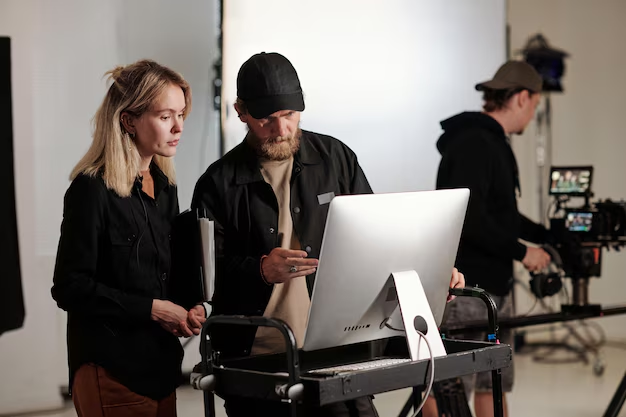The video production sector experienced a massive surge in the last 10 years, driven by the emergence of video platforms such as YouTube, Tik Tok, Instagram, and the increased need of high-quality content in advertising, marketing, and entertainment. You love telling stories, playing with technology, and creative work; a career in video production may be your key to a dynamic and fulfilling job in the digital realm.

But what are video production jobs and how can you begin a career in this exciting profession? This article will also discuss the different jobs in video production, skills needed, how to enter the industry and provide answers to a few questions to help you realise the road to success in this industry.
What Are Video Production Jobs?
Defining Video Production Jobs
Jobs in video production include a diverse compilation of duties that work towards the generation of video material, including pre-production and post-production. These positions include the use of cameras, sound equipment, lighting, editing software and many other tools to produce content on various platforms, including film, television, online streaming, social media and corporate videos.
Video production professionals are employed in various sectors such as film and television production, advertising, marketing of companies, event videography and creation of social media material. It can be a short film, TV commercial, or online tutorial: in any case, video production professionals have to record, edit and show visual materials in a convincing manner.
Types of Video Production Jobs
The video production process has different positions and each position has different skills and expertise that are required. Video production job titles vary and are among some of the most common:
• Producer: Manages all the video production process, including budget, schedule and production staff.
• Director: In charge of the creative side of the video, like shot composition, interpretation of the script, and vision.
Cinematographer/Director of Photography (DP), the person in charge of the camera work, lighting, and visual composition of the video.
• Camera Operator: Works with the camera during filming, makes sure that the shots are framed correctly and the video seems appealing to the eye.
Sound Engineer:Oversees recording of sound, such as dialogue, ambient sounds, and sound effects in filming.
• Video Editor: Take raw footage and make the final product, add effects, music, etc.
• Gaffer: controls the lighting on the set, making sure that the lighting enhances the intended mood and atmosphere.
• Grip: Installs, adjusts equipment with the gaffer, including camera rigs and lighting stands.
• Scriptwriter: Writes the script to the video, creating dialogue, structure, and narrative.
Example below: Motion Graphics Artist: Responsible to produce animated graphics, titles and visual effects in videos.
All of these roles entail an essential contribution to the realization of a video project and demand teamwork, artistic imagination, and technical skills.
Key Skills Required for Video Production Jobs
Technical Skills

Camera Operation: It will be very important to have a good understanding of the operation of different types of cameras, including professional DSLRs, and movie cameras.
Lighting Techniques: Most video production involves dealing with complicated lighting systems to achieve the desired atmosphere, and this involves learning about the various forms of lighting and methods of lighting.
Sound Design: Video producers should know about sound recording and mixing because quality of audio is just as significant as quality of video.
Editing Software: Editors and producers should be familiar with video editing software programs, such as Adobe Premiere Pro, Final Cut Pro, or DaVinci Resolve.
Motion Graphics: When dealing with animation or visual effects, it can be highly beneficial to learn programs such as Adobe After Effects or Cinema 4D.
Creative Skills
Storytelling: It doesn’t matter whether you are writing the script, directing the shoot, or editing the video, good storytelling skills are required to capture your audience.
Visual Composition: Visual composition is a sense that makes the video look good and helps create a flow in between a shot.
Problem-Solving: Video production is full of hurdles to jump over on the set, maybe technical issues or time limitations. Problem solving and the ability to think fast are essential skills.
Awareness and Co-operation.

Given that video production is primarily a collaborative effort, communication and the capacity to collaborate with others is essential. Directors, producers, editors, and other people involved in the video should work together to make the video to suit the objectives and creative vision of the project.
How to Start a Career in Video Production
1. Get Educated
Formal education is not always necessary when seeking employment in the area of video production, although many practitioners possess a degree or a certificate in an area such as film production, media studies or communications. Video production has technical and creative aspects and is taught in many universities and film schools. We also have numerous online tutorials which are beginner-friendly and teach the basics of filming or the complexities of editing.
2. Build a Portfolio
A portfolio is one of the most effective methods of entering the video production industry. This can incorporate short movies, music videos, vlogs, or even personal projects which demonstrate your talents. When applying a job, it is important to have a good portfolio as this will give the employer an idea of your talent and personality.
3. Gain Experience
Good places to get on-the-job experience in video production include internships and low tier positions. See how to get involved in actual productions, as a production assistant, camera operator, or editor. Small projects may also give you experience volunteering or volunteering your services to local businesses.
4. Network
Networking plays an important role in video production industry. Go to industry shows, film festivals or local gatherings to meet other professionals. Another good place to find people within the industry is through social media such as LinkedIn, Instagram, and Twitter.
5. Stay Updated

New technologies and trends are constantly developing in the video production industry. Keep up with the latest developments in cameras, editing software and effects to stay up to date on the job market.
FAQs About Video Production Jobs
1. What do I have to qualify to work in video production?
Although a college degree in film production, media studies or a similar discipline may be desirable but is not always necessary. Video production is one field that many have acquired knowledge through experience or online school. An impressive work history can usually carry more weight than a degree.
2. Video production employment has what pay scale?
Video production salaries may fluctuate in a wide range depending on the job or experience and the location. For instance:
Video editors—On average, video editors make between $40,000-80,000 a year.
Camera operators may also earn between $50,000 to $90,000 annually.
• Producers and directors can receive $60,000 to $120,000 per year.
3. Is it possible to be a freelance video productionist?
Yes, there are quite a number of video production professionals who are freelancers. This is flexible but it involves good networking skills and the capacity to sell yourself. Freelancers tend to collaborate with customers on a project at a time.
4. I am a novice, how should I begin with video production?
Begin by the fundamentals of filming and editing. Get a good camera and editing program, and go through the learning curve by creating personal projects. Online courses or workshops can also be taken to learn more on the craft. The best way to start with is by developing a portfolio and experiencing first hand.
5. What is required to produce video?
You will at least require a camera, tripod, microphone, lighting set, and software to edit photographs. When you become more experienced, you can add to your tools such equipment as, drone cameras, stabilizers, and green screens.
Conclusion:
Video production offers an exciting career to creative people with a passion in storytelling and technology. Video production offers a wide range of opportunities to choose with such positions as editing and directing, camera operation, and sound engineering, there is a way to everyone. With the right skills, a solid portfolio and experience in the field, you can start a prosperous career in this rapidly evolving and growing profession.
You are interested in working in film, television, advertising, or corporate communications, video production provides a great variety of opportunities to develop as a person, cooperate with others, and produce interesting pieces that will attract viewers. Begin following your dreams today and watch where you could go in terms of video production.





